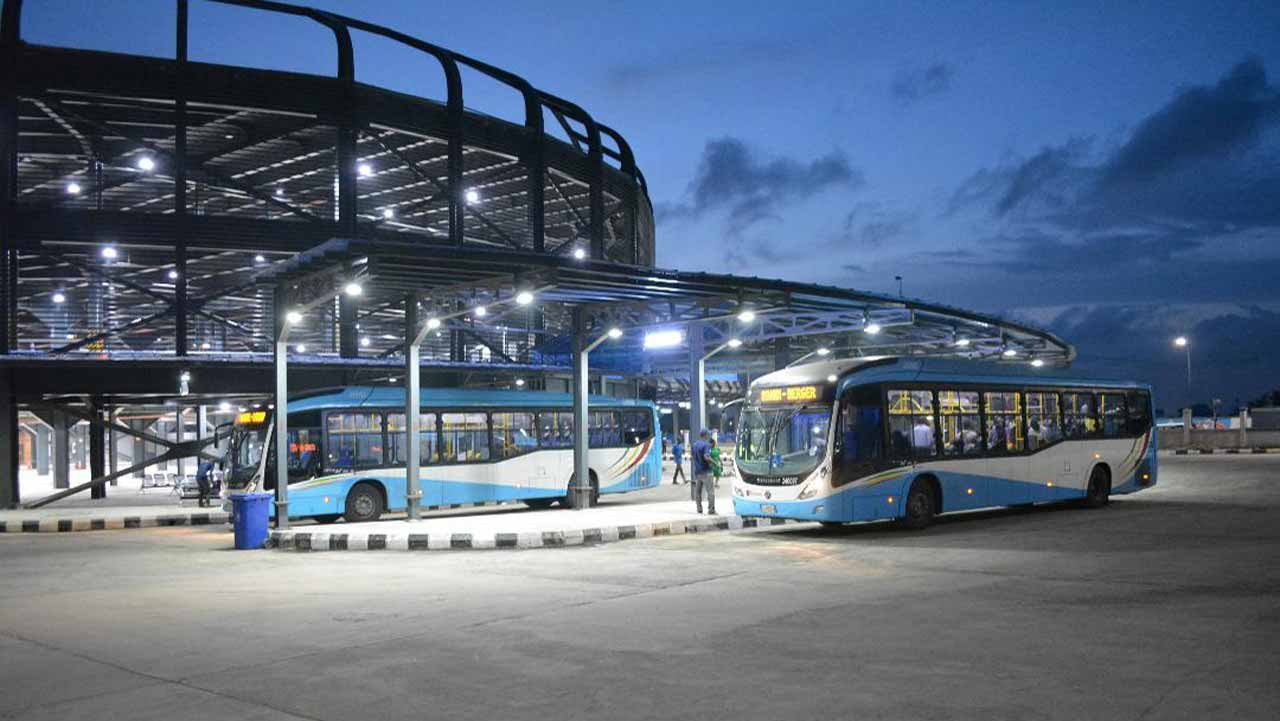
At the Oshodi Transport Interchange in Lagos, commuters reacted to the Federal Government 50 per cent transport subsidy, which ended last week. Passengers recount their experiences during the initiative, JUSTICE OKAMGBA writes
One sector that felt the immediate impact of the petrol subsidy removal in June was the transport sector. Across the country, transport fares doubled due to the petrol pump price jumping from N198 per litre before May 29, 2023, when President Bola Tinubu pronounced the end of the fuel subsidy regime, to N620/litre on June 17.
National Bureau of Statistics in its Transport Fare Watch report noted that the average fare paid by commuters for bus journey intercity per drop was N6,206.53 in November 2023, indicating an increase of 5.45 per cent on a month-on-month basis compared to N5,885.68 in October 2023, but on a year-on-year basis, the fare rose by 61.27 per from N3,848.48 in November 2022.
So, the announcement by the Federal Government that it would be giving 50 per cent transport fare rebate to commuters travelling intercity from designated motor parks across the country during the Yuletide, it was a huge financial relief for many Nigerians travelling during that period. The initiative ran from Thursday, December 21, 2023, to January 4, 2024.
The initiative covered rail services, luxury buses from partnering companies, such as Chisco, God Is Good Motors, The Young Shall Grow, etc.
The President said the move was aimed at easing the financial burden on citizens.
The Minister of Solid Minerals Development, Dele Alake, who coordinated the initiative, disclosed that over 163,000 passengers nationwide benefited from the subsidised inter-state trips for the end-of-the-year festive period.
On the final day of the 50 per cent fare rebate, when our correspondent visited Oshodi Transport Interchange in Lagos, many commuters and drivers lauded the government for the initiative.
They requested the government to extend the initiative beyond January 4.
The Managing Director, Planet Projects, Abiodun Otunola, who addressed journalists at the terminal, mentioned that passengers were pleasantly surprised by the reimbursement.
He said, “For the first time, people were being refunded money; some were refunded as high as N15,000. The passengers were shocked to see that the Federal Government could refund them. From this terminal, it was a 100 per cent compliance.”
An employee at Mosco Transport Company, Chinedu Ezeoba, explained, “When they first announced it, I was just sceptical about it. But I can say that it has been fully implemented here at Oshodi Terminal.
“After buying a ticket, they will address the passengers with their details on the manifest, and they get refunded 50 per cent.
“We travel from here to the East, and the fare is N30,000, but passengers get N15,000 back. So, I can tell you it has been a good initiative.”
With over 6,000 passengers estimated to have benefited from the rebate at the terminal, it is not clear how much money was refunded to the passengers within the period.
A ticketing officer with Edu Motors, Earnest Okoli, who spoke with The PUNCH on the implementation of the initiative, said, “The implementation has been working ever since small buses were included in the initiative. Before now, the subsidy was just for the luxury buses, but it was later extended to smaller buses.
“When passengers write their names on the manifest, the Federal Government agents, who were usually stationed here, then transfer 50 per cent of the funds back to them.
“These agents usually come here in the morning to implement that. They take the manifest to confirm the passengers, ask for their account number, and transfer back 50 per cent to them.”
He added that the day the transport firm collected N23,000 as transport fare, the passengers got N11,500 refund.
“The day we collected N21,000 as fare, passengers got N10,500. So, it has been like that and it ends today,” he averred.
A passenger en route to Ilorin, identified as Funmilayo, told The PUNCH that the move by the government had relieved some financial stress.
“For the first time in the history of this government, I am saying something positive about it. At first, I just thought it was a joke until after they started calling names of those who had paid their fares. I was refunded N3,000 after I paid N6,000.”
Similarly, a youth corps member, who was travelling to Kwara, Komolafe Abolore, was elated upon receiving a refund of N3,000 out of the N6,000 she initially paid for her fare.
Abolore expressed her joy, stating, “On getting here, they informed us about a 50% subsidy, and we were refunded N3,000 from our N6,000.
“We want to express our gratitude to the Federal Government of Nigeria. I am a youth corps member currently serving in Kwara State and I am very happy.”
Surge in passenger traffic
According to Otunola, the 50 per cent rebate led to a 35 per cent increase in passenger traffic at the terminal.
He said, “We have been managing this terminal for the past five years, and for the first time, we are seeing over a 35 per cent increase compared to the number of passengers we would normally have recorded during the period.
“As you know, transport is one of the pain points of fuel subsidy removal. Because of this laudable programme of the Federal Government, a lot of Nigerians have been trooping in the morning, afternoon, and evening to take advantage of the 50 per cent discount.
“From this terminal, we have handled over 6,000 passengers and close to 700 vehicles, which is far higher than what we usually have during the Christmas period,” he stated.
The Operations Manager, Planet Projects, Oshodi Transport Interchange, Kolawole Babatunde said it was contracted by the Federal government to supervise, monitor, and ensure that the funds earmarked for the project were dispensed directly to the passengers.
Babatunde said, “It has been so far, so good. Since flagging off the exercise on December 22, last year, we can confirm that passengers travelling from the terminal have benefited. Some to the tune of N15,000, depending on the cost of the transportation to their destinations.”
Passengers wanted extension
Commuters at the Oshodi bus terminal and other accredited parks in Lagos State appealed for an extension of the subsidy.
While the fare rebate for buses ended on January 4, the government extended it for all train services until January 7.
Commuters, who spoke with The PUNCH, argued that a significant number of individuals who travelled during the festive period were yet to return to their cities or states of residence.
Advocating for an extension, they argue that prolonging the fare reduction scheme by a week would provide relief to those still in transit.
A passenger, Kola Olakunle expressed gratitude for the President’s kind gesture but emphasised the need for an extended subsidy period.
Another commuter, Iyabo Akintunde also joined the call for an extension, underscoring the need to grant commuters an additional week of reduced fares.
Also, another passenger, Mariam Ogundeji, said that the scheme had impacted her life, pleading with the government to extend it.
Loopholes
Nigeria saved approximately N1.45tn between June and September 2023 from the removal of the petrol subsidy, according to FAAC allocation records obtained from the National Bureau of Statistics.
President Tinubu had said the government planned to re-channel the funds into better investment in public infrastructure, education, healthcare, and jobs that would materially improve the lives of millions.
However, there are concerns about the transparency in utilising the funds to subsidy transport fares.
Some of the critics of the initiative claimed that the 50 per cent subsidy from the Federal Government was still shrouded in ambiguity, citing a lack of transparency in the entire process.
One of the critics, Chukwuemeka Ejemba, said, “How do we account for this? There is no transparency. Perhaps around 10,000 people benefited, and then the rest went to the embezzlers.
“We are familiar with the game. Everyone is aware of what these people are capable of. However, we should acknowledge them for this; at least they consider the people as beneficiaries. Remember, they don’t need our permission to loot.”
The critic pointed out that palliatives would not solve Nigeria’s problems, instead, it is exacerbating them.
“I hope you know trillions of naira have been expended to cushion the effects and bring poor people out of poverty, but instead, it deepens their plight,” Ejemba said.
Another critic, Adamu Abdul, said if the government was serious about subsidising transport for the masses it should slash the cost of transportation.
“How is this even sustainable? The reality is that people are suffering and you can see how the transport fare has affected the cost of goods in the market. Ordinarily, we shouldn’t be charging passengers this much, but that is just the situation of things.
Despite the criticisms from some quarters regarding the initiative, Otunola said the government should be credited for initiating the programme.
Otunola anticipated improvement in subsequent years, foreseeing enhanced implementation with increased awareness, improved information dissemination, and broader stakeholder engagement.
He remarked, “The initiative was more like an emergency problem by the government. I think the government needs to be commended.
“For now, our transport system is still not very well organised. So, we don’t have the institutional strength or infrastructure to implement this kind of programme. Therefore, we have to give them credit for even starting this.”












